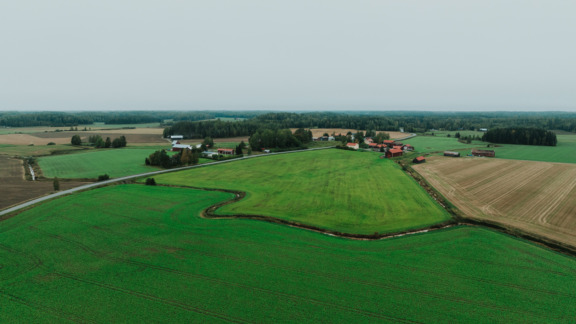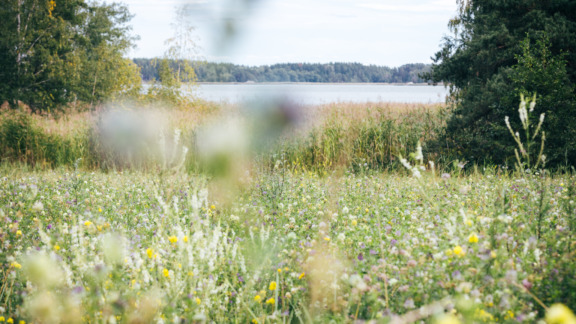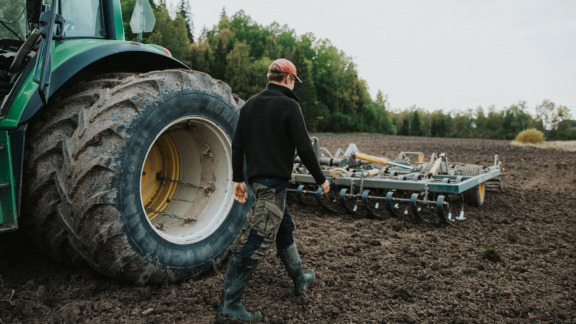BLOG: Carbon Action at 4/1000 day at Madrid COP25
UN climate talks in Madrid were a disappointment. COP25 concluded yesterday with an agreement among countries to take on more ambitious goals. That agreement is not strong. It failed to resolve the main issues on the table, like creating rules for trading carbon emissions credits. Regardless of the political failure, a lot of action is taking place in the non-binding sector and the activities around soil carbon are a positive example.
During the COP25 meeting, a very ambitious and encouraging ’’4/1000 Day’’ was organized. The aim of the 4/1000 initiative is to demonstrate that agriculture, and in particular agricultural soils, can play a crucial role in both climate change and climate adaptation. The over 30 presentations around the world brought forth a lot of promising practical action and co-operation.
Background
At the Paris Climate Summit 2015, France presented a 4/1000 initiative. An annual growth rate of 0.4% in the soil carbon stocks, or 4‰ per year, in the first 30-40 cm of soil, would significantly reduce the CO2 concentration in the atmosphere related to human activities (https://www.4p1000.org/. The initiative signed by Finland, and promoted by the Finnish Government Programme, is ambitious. BSAG is also a member of the 4/1000 Consortium. On the occasion of the COP 25 in Madrid, on the 11th of December 2019, the 4/1000 Initiative organized its third ’4/1000 Day’.
Finnish contribution
From the very beginning, 4/1000 has been an inspiration for the Carbon Action work. It was thus a great honour to have the possibility to give a speech at the VIP section of the 4/1000 day about how Finland and Carbon Action are promoting 4/1000. The agenda of the day was: ’’How to move from pilot project to large scale change’’. This suited Carbon Action work perfectly. Carbon Action started as a pilot, funded by Sitra (2017-2019), and has now grown into a platform.
During the Day, State Secretary Kimmo Tiilikainen first told how Finland is committed to enhancing natural sinks, how 4/1000 is supported by the government programme and during Finland’s EU presidency, and that Carbon Action is important in advancing the work in Finland.
In my speech I stressed the importance of the holistic approach of the platform. The Carbon Action platform brings together farmers, advisors, researchers, companies and decision-makers. The platform contains several funders and projects and enables close cooperation among the projects. I emphasized that we need to act, do lot of things at the same time, including experimenting on the farms. To move to large scale, we need all these different actors to work together towards the common goal. The chair of the day, Wolfgang Zornbach, from the German Federal Ministry of Food, Agriculture and Consumer Protection, concluded that the Carbon Action platform could be a template for many other countries in the world.
Take home messages from the 4/1000 Day
The Day was opened by two Agriculture ministers, from Spain and France. They stressed the importance of the 4/1000 initiative. Agricultural soil holds an enormous potential to mitigate climate change by storing carbon, and also provides many other ecosystem services. Spanish Minister Luis Planas concluded well: the 4/1000 initiative is now more relevant than ever.
Chad Frischam from DrawDown gave a very inspirational speech about a regenerative future. We should replace, reduce and restore. He reminded us that regenerative agriculture is nothing new. Industrial agriculture has destroyed the land, and now we need to regenerate it. Regenerative practices bring carbon back to ground, creating win-win-win-win- (I didn’t count how many wins he mentioned..) solutions. Very little negative effects. He concluded that we need to think beyond sustainability, build a regenerative future that is connected to nature.
Jean-Francois Soussana from INRA presented highlights from the IPCC special report on land. He presented different land management responses and their global impacts on land-based challenges (co-benefits and trade-offs). For increased soil organic carbon content, only positive impacts (co-benefits) were found in the IPCC report.
Impressive work of the CIRCASA project was presented by Cristina Arias-Navarro. She presented us the preliminary vision of the CIRCASA International Research Consortium (IRC). This IRC will provide a great possibility for co-operation also with Carbon Action, especially on the international soil carbon monitoring system. an interesting new report by CIRCASA provides thorough insight into the topic: ’’Assessing barriers and solutions to the implementation of SOC sequestration options’’
Cornelia Rumpel, the chair of the scientific and technical committee of the initiative, emphasized the strong role of science behind the initiative. She told that there is a general consensus that increasing soil C is valuable due to the co-benefits and contribution to climate change mitigation. According to recent studies, the technical potential for agricultural soils is limited to about 1,3 Gt OC y-1. She reminded that 4/1000 is an aspirational goal, not a normative one. It is achievable locally, but not everywhere. There are many possibilities for improving nutrient and organic residue management at farm, region and national scales.
Frederic Lambert from the French Ministry of the Agriculture and Food told us about the ambitious work done in France. He estimated that in 2019, 10% of farmers in France are implementing agroecological practices. There also has been major changes in farmers’ education system and research. He emphasized that the major issue is the strengthening of the CAP in order to respond to climate change challenges. He told us about lessons learnt: communicate widely and build on pioneer farmer’s experience. Ensure continuous political support. Make sure that markets can reward agroecological products. Take care of transition costs. Work with farmer organizations and the private sector.
Dalma Somogyi ’climate smart agriculture’ WBCSD told us about the role of companies in changing value chains. She said that there is a clear business case for investing in soil health. Whilst an investment may be primarily focused on one outcome (e.g. for enhancing crop productivity or livelihoods, climate mitigation, improving water resources, or protecting biodiversity), an investment in soils for any one of these outcomes will deliver multiple benefits (see more on the report). She also told us about the One Planet Business for Biodiversity (OP2B), a business coalition on biodiversity with a specific focus on agriculture. One pillar of OP2B is focused on regenerative agriculture: to scale up regenerative agricultural practices and to reduce synthetic agro-chemical inputs to protect soil health. Very important messages for the Carbon Action business platform also.
Conclusion
There is still a long way to go for the Initiative. Further research and practical experience on regenerative agriculture is required to turn the initiative into action. But the 4/1000 initiative, and also Carbon Action are on the right track.
Move, evolve, experiment and increase farmers’ awareness on the necessity of changing production methods towards preserving soil capital and its health. It is the society as a whole that must drive and support these changes, from politicians or decision-makers, to the civil society and NGOs, to advisors and farmers, to the scientific world of research and education, to companies, and to international organisations and donors. One of the major roles of the 4/1000 Initiative is to strengthen this path and create the necessary synergies between different projects and platforms.
Laura Höijer, content director, Baltic Sea Action Group
See more:
https://4per1000day2019.sciencesconf.org/
https://www.youtube.com/watch?v=MH4xDUryzLY (you can watch all the presentations)



